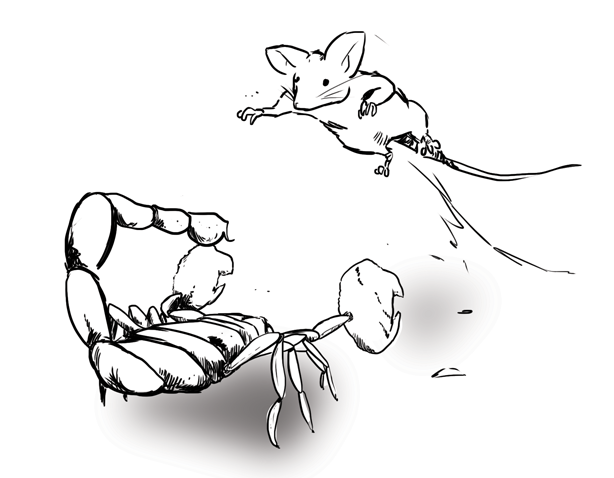Print Edition: October 30, 2013
If you found yourself stung by a bark scorpion, your reaction would probably involve profanity and looking up the number for poison control.
In contrast, a grasshopper mouse kills the scorpion and eats it.
Considering that the bark scorpion’s sting is extremely painful to most animals, the lack of the grasshopper mouse’s response is both surprising and intriguing to scientists.
As it turns out, grasshopper mice don’t even feel the sting, according to a study recently published in Science.
The reason behind the lack of response lies in the mouse’s brain chemistry – specifically, in voltage-gated sodium channels. In normal circumstances, a stimulant triggers sodium flow into these channels, alerting the brain that something hurts.
When that stimulant is bark scorpion venom, however, the reaction fails to complete: an amino acid binds with the venom to block sodium from the channel and from triggering the feeling of pain.
Scorpions aren’t usually on the list of mouse food preferences; the five researchers behind the study speculate grasshopper mice evolved this way because food is scarce in their natural desert environment. By ignoring the scorpion’s sting, the grasshopper mouse renders the scorpion’s main attack useless and makes the scorpion relatively easy prey to be killed and consumed.
Dr. Ashlee Rowe, one of the researchers behind the study, told the LA Times that this is an impressive evolutionary feat.
“The grasshopper mouse has developed the evolutionary equivalent of martial arts to use the scorpions’ greatest strength against them,” she says. “This venom kills other mammals of similar size.”
As part of the study, Rowe and four colleagues injected small amounts of venom into the paws of both grasshopper mice and house mice. In the control group, they injected the paws of mice with a saline solution. By observing the amount the mice licked their paws where the solutions were injected, the researchers could judge which injections bothered the mice more.
According to Harold Zakon, another researcher behind the study, the results were “completely ridiculous.”
While the house mice licked their paws more after the injection of venom, the venom didn’t seem to bother the grasshopper mice at all. In fact, the grasshopper mice were more distressed by the saline injection than the venom.
“One would think that the venom would at least cause a little more pain than the saline solution,” Zakon said in a prepared statement to the LA Times.
The amino acid reaction is so effective at blocking pain in grasshopper mice that the researchers speculate it could be used as a foundation to build “highly selective, nonaddictive analgesics” for human use.
While this pain-blocking response seems like it would be a useful adaptation for all species, the researchers note that it may only be a useful automatic response in this specific situation. Bark scorpion venom aims to produce a reaction of pain to debilitate prey. The attacks of other predators, however, result in actual damage to prey, meaning that pain serves to warn an animal that it’s injured. Without this response, the animal might fail to get itself out of a dangerous situation, or even sustain further damage without realizing it.
“Painful venoms are used to deter predators. Pain itself, however, can signal damage and thus serves an important adaptive function,” the researchers state in the introduction to the study. “Evolution to reduce general pain responses, although valuable for preying on venomous species, is rare, likely because it comes with the risk of reduced response to tissue damage.”


